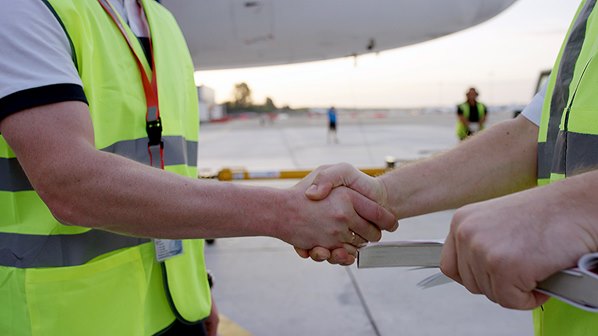
In the second of a special Customer Service Week series, Samantha Saunders, Head of Innovation & Regulatory Compliance at OmniServ explores how cross-training staff improves morale, attitude and service delivery.
Capability & Skills: Identifying and nurturing customer service skills in your organization.
Airports are like small towns, and like small towns are broken up into districts – there’s landside and airside (the latter being the area ‘beyond’ security and customs checks), there’s Duty Free, the food hall, baggage and so on.
That means it’s easy for staff to become compartmentalised and focus on what their ‘part of town’ is all about, while losing sight of the bigger picture.
Companies across industries face the same challenges. How often have you read articles about how we need to break down barriers and lose the ‘silo mentality’? The issue is, if you have an ‘us vs. them’ mentality within a company, then it’s all too easy to lose sight of the shared goal – to deliver seamless service to your users and customers.
One sure way to get people to lose the insular mindset is to cross-train staff, giving them the opportunity to experience what life is like in the other bits of the company (and, in our case, the other bits of the airport) and the challenges that their colleagues face every day. If they understand what other staff do and why, they’ll start thinking about how their own roles mesh with the whole company and its objectives.
Take our biggest client, Heathrow. It’s the world’s second busiest airport by international passenger numbers and saw 75 million travellers pass through its terminals last year. On average, it serves around 220,000 passengers a day, who are assisted by more than 76,000 staff.
Many of those staff are vital to the smooth running of the airport, they are invisible to passengers. Even so, there are thousands who have day-to-day contact with the general public, in all its moods, and who play a key role in delivering the best possible customer service.
My particular responsibility is for our assistance services helping the 1.8 million passengers a year across the UK airports we operate in who have some form of disability (1.2 million of them at Heathrow alone); passengers with Reduced Mobility (PRM), as the airline industry and the regulators call them. People, as I call them.
Our PRM staff face challenges daily due to peaks and dips in passenger numbers, late arrivals and departures, changes in where flights are boarding or landing, unexpected demand (many PRM passengers let us know in advance, but it’s not a requirement), language barriers. Also for some people, their needs may change as they travel across time zones so when they left Los Angeles for example, they didn’t need any assistance however now they’ve arrived at Heathrow, they do. Our teams need to react accordingly.
It’s important to recognise just how important and challenging the employees’ job can be. Our PRM support staff is on the customer service front-line every day and likely spend more one-to-one time with a customer than any other airport or airline employee. That makes them ambassadors for great customer service, and also puts them on the front line when challenges arise.
To help our entire team understand the importance of this role, we try and have staff from other areas of operations shadow members of the PRM team.
Recently, the various members of Manchester Airport’s security staff went through this cross-training, and the response was incredible. Comments included “I feel that I’ve made a real difference today” and “I will fundamentally do my job differently now.”
The type of close role shadowing we have offered is known as horizontal cross-training. When staff contributing to an eco-system (such as an airport) better understand what each other does, they feel a greater commitment to the bigger picture, are more likely to stay with the company longer and can provide even better customer service.
Passengers, much like customers in a large department store, don’t necessarily understand that all staff they encounter under one roof work on different teams or for different organizations. If they ask any member of staff for help and they are met with a positive response, their experience is improved and they feel cared for. Cross-training helps create this holistic experience.
Cross-training also has significantly improved staff morale and helped counteract the ‘silo’ effect that large organizations can fall prey to. This boosts our industry as a whole. I would urge all organizations to look at the benefits that offering a cross-training staff programme would have on their service users, employees, and their industry. I’m sure you’ll find it’s a win, win, win situation.
Other articles in this series:
- Delivering Quality Customer Service to Disabled Passengers
- Recognizing Great Staff Performance Is Key to Improving Service Quality
- Company-Wide Commitment Is Needed to Lead Customer Service Innovation
- Working in Partnership to Deliver Enhanced Customer Service
About OmniServ
OmniServ Limited is the International Division of ABM Aviation, the aviation division of ABM Industries. ABM Aviation provides a comprehensive range of innovative and dependable solutions, including Persons with Reduced Mobility (PRM) Operations, to more than 100 airports globally. This includes the top 30 airports within the USA and 15 airports within the UK. Established in 2004, OmniServ employs over 5000 staff delivering ‘Legendary Service’ across a wide portfolio of aviation services.




